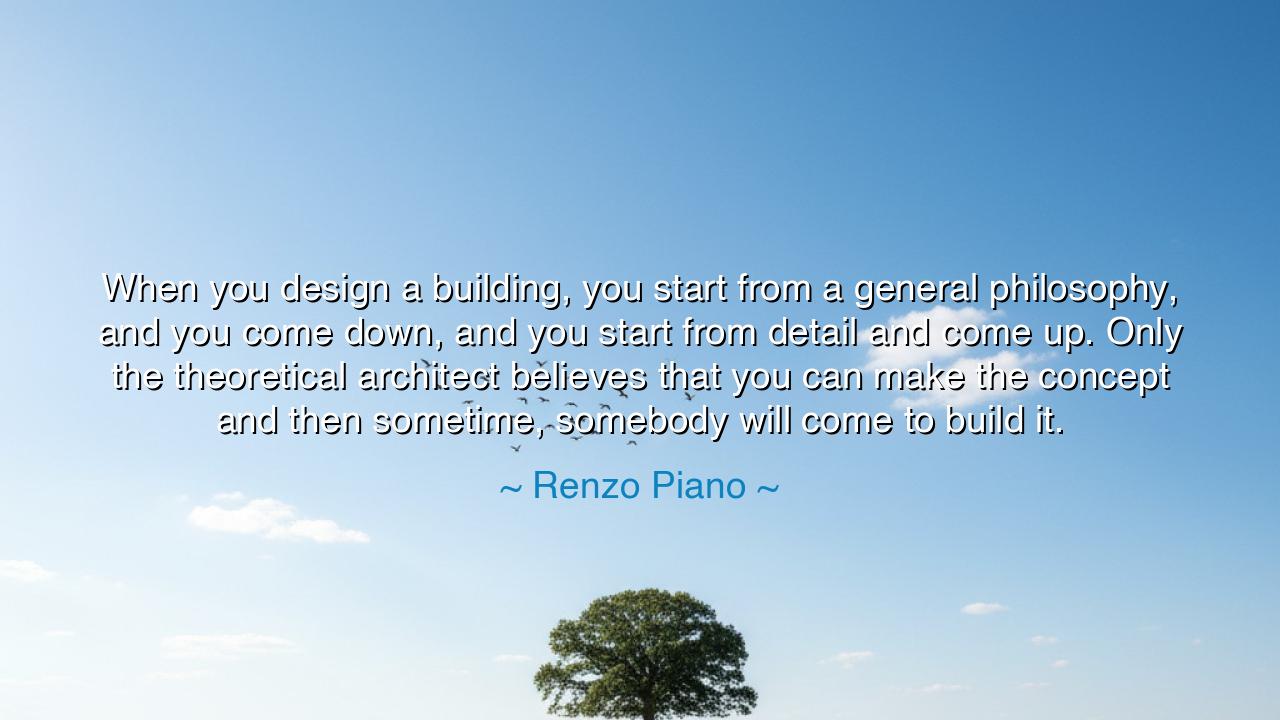
When you design a building, you start from a general philosophy
When you design a building, you start from a general philosophy, and you come down, and you start from detail and come up. Only the theoretical architect believes that you can make the concept and then sometime, somebody will come to build it.






“When you design a building, you start from a general philosophy, and you come down, and you start from detail and come up. Only the theoretical architect believes that you can make the concept and then sometime, somebody will come to build it.” – Renzo Piano
In these words, Renzo Piano, the master builder of light and space, reveals the sacred truth of creation — that vision and craft are inseparable, that the dream and the hand must work in harmony. His message is not for architects alone, but for all who labor to bring an idea into the world. To design — whether it be a building, a life, or a legacy — is to stand at the meeting point of philosophy and practice, of heaven and earth. The philosopher dreams the stars; the builder lays the stone. Only when both are united does the world rise into something enduring and true.
In saying that one must begin with a general philosophy and descend into detail, Piano speaks to the rhythm of all creation. Every great work begins as an idea, a breath, a glimmer of purpose. But ideas alone are mist — beautiful, fleeting, ungraspable — until they are given structure. To “come down” from the realm of thought is an act of humility, for it means to enter the world of limits and labor. Yet it is there, in the dust and detail, that vision is proven worthy. The detail is where the divine meets the human; it is where dreams take form through discipline.
Piano contrasts this living process with the folly of the theoretical architect — the one who builds only castles of concept, who draws visions upon paper but never tests them against the resistance of the real. Such a dreamer may speak of beauty, but his beauty remains untested, untouched by wind and time. In truth, theory without practice is like a tree without roots; it may rise swiftly, but it cannot endure. The true architect, says Piano, both descends and ascends — descending from the mountain of vision to the valley of detail, and ascending again through craft until the dream is reborn in stone and glass.
This wisdom is as old as the world itself. Consider Michelangelo, whose divine imagination saw angels hidden in marble. Yet he did not rest upon vision alone. For four years he lay upon his back beneath the vault of the Sistine Chapel, his eyes filled with dust, his muscles torn by labor. The beauty that men now gaze upon in awe was born from his union of philosophy and toil, of heavenly thought and earthly suffering. He did not simply conceive the infinite; he crafted it, stroke by stroke, until creation itself took form upon the ceiling.
So too, in every field of human endeavor, the same law prevails. The inventor who dreams of flight must learn the weight of metal and the pull of gravity. The poet who seeks to move the soul must master the meter and the word. The leader who envisions justice must study the laws, the people, the patient art of persuasion. It is the marriage of ideal and detail, of vision and action, that births the possible from the impossible. Those who dream without building remain spectators of beauty; those who build without dreaming raise monuments without soul.
Piano’s teaching reminds us that creation is an act of balance. Begin, he says, with philosophy — know your purpose, your guiding truth, your “why.” Then descend into the details, the thousand patient tasks that seem small but form the bones of greatness. And when the dust clings to your hands, rise again to behold the whole — the structure that your vision and labor have made one. Thus every true act of creation is a circle, uniting the lofty and the lowly, the thought and the thing, the dream and the deed.
The lesson, then, is this: Do not dwell only in the clouds of concept, nor lose yourself in the rubble of routine. Let your heart dream, but let your hands build. Seek to make your visions real, even if it demands humility, patience, and imperfection. For in the struggle to bridge the two worlds — the ideal and the actual — you become not just a thinker or a worker, but a creator, one who participates in the divine act of making.
And when at last your work stands before you — whether it be a building, a poem, or a life well-lived — you will know the truth that Renzo Piano teaches: that the greatness of a vision lies not in how grandly it is imagined, but in how faithfully it is built.






AAdministratorAdministrator
Welcome, honored guests. Please leave a comment, we will respond soon